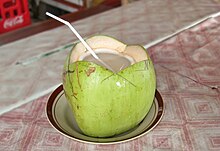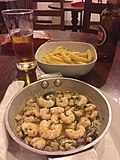Cuisine of São Tomé and Príncipe



Santomean cuisine comprises the cuisine, dishes and foods of São Tomé and Príncipe, a Portuguese-speaking island nation in the Gulf of Guinea, off the western equatorial coast of Central Africa. The country consists of two archipelagos around the two main islands: São Tomé and Príncipe, located about 140 kilometres (87 mi) apart and about 250 and 225 kilometres (155 and 140 mi), respectively, off the northwestern coast of Gabon.
Overview
[edit]Domestic food-crop production is inadequate to meet local consumption, so the country imports much of its food.[1] In 1997, it was estimated that 90 percent of the country's food needs were met through imports[1] including meat and food grains.[1] In 2003, it was estimated that 8.33% of the country's total land is arable.[2]
Primary food crops include bananas, breadfruit, taro, maize, beans, papaya, palm oil, and primary agricultural production crops for export include cocoa, copra and coffee.[1][3] Fish and seafood is prominent in São Tomése and Príncipe cuisine, and the fishing industry contributes approximately 25 percent to the country's gross domestic product.[1][4] Poultry is also raised in São Tomé and Príncipe.[1]
The nation's cuisine has been influenced and shaped by African and Portuguese settlers.[5]
Common foods
[edit]Staple foods include fish, seafood, beans, maize and cooked banana.[4][6] Tropical fruits such as pineapple, avocado and bananas are a significant component of the cuisine.[4] The use of hot spices is prominent in São Tomése cuisine.[4] Coffee is utilized in various dishes as a spice or seasoning.[4] Breakfast dishes are often reheated leftovers from the previous evening's meal.[6]
- Arroz doce (rice pudding) is a traditional breakfast food prepared with sweet corn and coconut[6]
- Banana pap is a porridge[5]
- Barriga de peixe is a traditional Santomean dish of grilled fish served with rice, breadfruit or manioc (cassava)[6]
- Blablá[clarification needed][6]
- Broa—cornmeal and rye bread[6]

- Cachupa is a dish prepared with green beans, broad beans and corn.[6]
- Calulu is a traditional dish prepared with grouper or smoked fish, prawns, tomato, okra, aubergines (eggplant), onion, and spices, including grains of paradise.[4][6] Some versions of the dish may include or use smoked chicken, breadfruit, óssame (a red, bulbous fruit) or bananas.[6] It takes around five hours for traditional calulu to be prepared.[6] Variations of callaloo are eaten in other countries
- Chicken
- Chicken with coffee sauce is prepared with chicken, coffee, white wine, cream, garlic, coffee beans and spices[4]
- Coconut
- Djogo[clarification needed] [6]
- Flying fish, both cooked and dried varieties[6]
- Jackfruit[6]
- Mango[6]
- Omelettes [6]
- Boiled pork is a dish prepared with pork, tomato, spinach, onion, garlic and spices[4]
- Jackfruit being prepared for consumpution
- Shrimp and French fries as served in a local hotel, São Tomé


- Safu, short of safous, is the Dacryodes edulis fruit
Beverages
[edit]
- Carioca de limão is prepared with lemon peel and hot water.[6]
- Coconut water[6]
- Coffee[6]
- Soft drinks [6]
- Tea[6]
Alcoholic beverages
[edit]- Aquardente is a distilled beverage prepared from sugar cane.[6]
- Rosema is the country's national beer.[6] Other beers, such as Super Bock and Sagres lager are imported from Portugal.[6] Criollo is another brand of beer produced in the country.[6]
- Gravana rum is prepared from sugar cane.[6]
- Palm wine is considered a national drink of São Tomé and Príncipe.[6]
- Ponche is a cocktail prepared with honey and Aquardente.[6]
- Wines, typically imported from Portugal[6]
Street foods
[edit]
Street foods include stews, safú (a fruit) and corn on the cob.[6]
Delicacies
[edit]Estufa de morcego is a bat stew delicacy that is served on saints days and during fiestas.[6]
Desserts and sweets
[edit]- Açucarinhas are prepared from coconut and sugar, formed into patties, and fried in palm oil.[6]
- Aranha is prepared with coconut, sugar strings and food coloring.[6]
- Canjica is a porridge that is prepared with canjica maize kernels, egg, sugar, cinnamon and water.[4][5]
- Chocolate
- Chocolate mousse[6]

Snack foods
[edit]- Banana seca is a dried, whole banana that has a smoky flavor.[6]
- Bobofrito is a specialty of Príncipe that consists of bananas fried in coconut oil.[6]
- Bread rolls with Portuguese salami and sausages[5]
- Fios is a snack food prepared with corn flour and bananas.[6]
- Gigumba (peanut brittle) [6]
- Palla-palla are crisps prepared with cocoyam or banana.[6]
Condiments
[edit]- Piri-piri sauce prepared with malagueta pepper is commonly available in Santomean restaurants.[6]
See also
[edit]References
[edit]- ^ a b c d e f Agricultural Marketing Directory for U.S. & Africa Trade - Mary E. Lassanyi, Wayne Olson. p. 206.
- ^ "São Tomé and Príncipe: Agriculture". NationMaster. Archived from the original on 23 February 2014. Retrieved 8 February 2014.
- ^ Sao Tomé and Príncipe - Recent Economic Developments and Selected Issues (EPub) - International Monetary Fund. p. 70.
- ^ a b c d e f g h i The Recipes of Africa – Dyfed Lloyd Evans. pp. 174-176.
- ^ a b c d São Tomé. Foodspring. Accessed February 2014.
- ^ a b c d e f g h i j k l m n o p q r s t u v w x y z aa ab ac ad ae af ag ah ai aj ak al am an Sao Tome and Principe – Kathleen Becker. pp. 74-79.
Further reading
[edit]- Weinberg, Samantha (April 2013). "Chocolate and Slavery". Intelligent Life magazine (The Economist). Archived from the original on 2 February 2014. Retrieved 8 February 2014.
- Rice, Xan (January 15, 2009). "The chocolate king of São Tomé". New Statesman. Retrieved 8 February 2014.
- Democratic Republic of Sao Tome and Principe: Request for a Three-Year Arrangement Under the Poverty Reduction and Growth Facility. International Monetary Fund. pp. 4–5.


 French
French Deutsch
Deutsch

